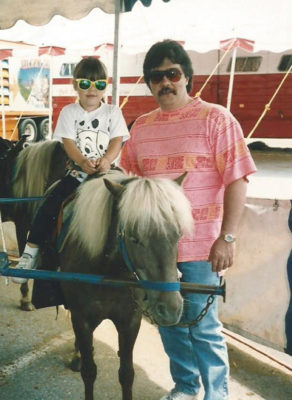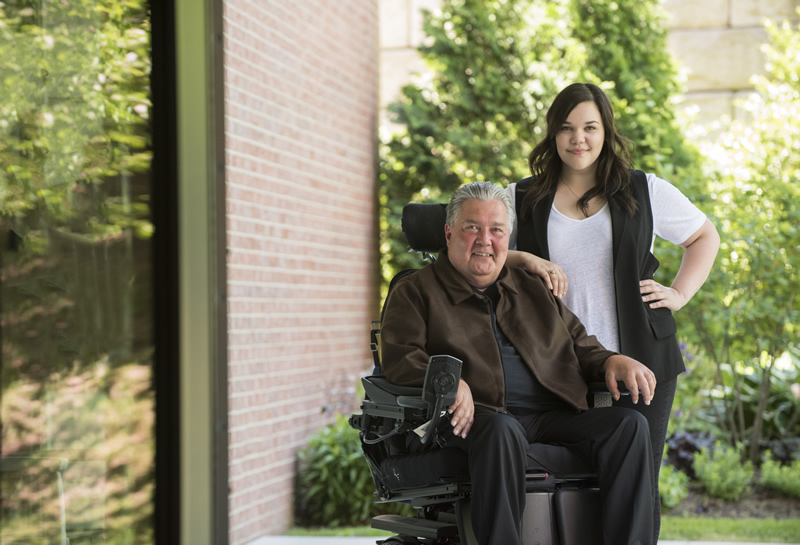A Technical Design student creates clothing for a special person with ALS—her father
Michael Robbins served as his daughter Caitlin’s fit model for her FIT capstone project, wearing a brown wool jacket and black wool pants modified for a person with ALS. The project benefited her classmates too, says Luz Pascal, who oversees the capstone course for Technical Design. “It made an impact on everyone who saw it. She used it not only to comply with the course requirements but to educate us about ALS.”
One night in April 2015, Caitlin Robbins was helping her father, Michael, walk through their house. His ALS had progressed to the point that he was struggling to get around, and he was leaning on her shoulder. Suddenly he cried out, “My knee!” and fell to the floor. He would never walk again.
It was the moment they had dreaded since his diagnosis in 1997. Amyotrophic lateral sclerosis, or Lou Gehrig’s disease, destroys the neurons that control voluntary muscle groups. In the course of the illness, patients lose the ability to walk, talk, swallow, and eventually, to breathe. Most die within five years.
Michael’s case, however, progressed far more slowly. “He’s lived with it for 19 years,” Caitlin says. “I don’t know of anyone who’s had it longer, except Stephen Hawking.” Michael was unusual in other ways, too. The former New York City sanitation supervisor has an oddball sense of humor and an idiosyncratic personal style. “He’s very particular about what he wears,” Caitlin says. “We once spent hours at Macy’s looking for just the right velour track suit. He got, like, four. Plus he has a million shoes! I’m sure it’s where I get my interest in fashion.”
 Growing up on Staten Island, she created clothes for her American Girl and Barbie dolls, and planned to be a costume designer. Caitlin’s older sister helped with their father’s care (their parents divorced when Caitlin was 15). But Michael’s ALS steadily worsened. Unable to travel, he missed Caitlin’s high school graduation. By 2011, he could barely use his hands.
Growing up on Staten Island, she created clothes for her American Girl and Barbie dolls, and planned to be a costume designer. Caitlin’s older sister helped with their father’s care (their parents divorced when Caitlin was 15). But Michael’s ALS steadily worsened. Unable to travel, he missed Caitlin’s high school graduation. By 2011, he could barely use his hands.
Caitlin earned an associate degree at the Fashion Institute of Design and Merchandising in Los Angeles, then returned home to help her dad when her sister got pregnant. In 2014, Caitlin began the Technical Design program at FIT. It was a two-hour trip each way from southern Staten Island, but she loved the coursework. “Patternmaking came easy for me,” she says. “My garments always balanced well. Plus, I like the problem solving and fittings.” She was away most of the day, but she left prepared meals for her father and he was able to take care of himself. Then the fall changed everything.
While Michael recovered in a rehabilitation center, Caitlin negotiated with Medicaid. Her weeks of diligent phone calls weren’t enough: In July, her father was discharged without a professional care plan. Caitlin was responsible for everything from meals to toileting. As it happened, she was slated to begin a summer internship at a prestigious design firm. She sent an anguished email, declining the opportunity.
It took three weeks for Medicaid to initiate two hours a day of care. Caitlin worried about the future. Classes started at the end of August; eventually, she would need a job, which meant more time away.
One day at the movies, she saw a promotion for an innovative living space in New Orleans. The specialized skilled nursing center is designed so residents can thrive independently. Each is given a tablet computer that can be used to open doors, adjust the thermostat, summon the elevator or caregivers, and many other operations. Similar centers operated in Boston and Georgia; Caitlin was determined to get her father into one, and she applied to all three.
“I don’t know how I passed the fall 2015 semester, because I could barely get to class,” she says. For weeks, she tried to get a wheelchair ramp for the house. The cost was $8,000, and Medicaid wouldn’t cover it. She managed to negotiate with them for 12 hours a day of care, though, and was thus able to get a part-time temp job at Badgley Mischka; the firm eventually hired her permanently. In December, on the last day of the term, she received a call from the Leonard Florence Center for Living in Boston, offering Michael a room.
The move brought a dramatic change to her father’s life. For years, Michael had only left the house to see doctors; at Leonard Florence, nurses help him get around town to shop at Target and to see movies and Red Sox games. Residents can personalize their rooms. “I want mine painted blue!” he told Caitlin, and so it was. She brought him posters of Babe Ruth and Brigitte Bardot, too. But one night, everyone was dressing up to see a play, and Michael had nothing to wear.
Over the years, Caitlin made clothing to accommodate Michael’s needs, including a pair of jeans with a customized elastic waistband. Now he needed dress pants and a blazer. She thought, “Okay, I can do that.”
With the guidance of Assistant Professor Luz Pascal, Caitlin made the creation of her father’s clothing her capstone project. It was the kind of challenge a technical designer relishes. Michael can move his head, torso, and right foot, but he’s otherwise immobile. A caregiver can guide one arm into a jacket easily, but the second can be difficult; pants are equally tough. Michael will always need assistance getting dressed, but that shouldn’t rule out fashionable clothes, Caitlin says: “I didn’t want the outfit to be visually different. It should be functional, but still stylish.”
For the pants, she created a concealed zipper in the side seam from waist to below the hip so they can slip on. The jacket has an innovative hidden closure in back to make putting it on simpler, and a front zipper that uses magnets to ease the tricky insertion into the slider. Pascal praises her discipline, saying, “It was a lot of fitting and pattern corrections, but she was dedicated and never gave up.” Caitlin admits she’s not great at sewing (though she’s improving), but hand skills aren’t the focus in technical design; students learn instead how to engineer garments for fit, size, and industry standards. Michael’s clothes do fit, and he likes them—a lot. “They get a lot of compliments,” he says. “No one can tell that they have extra zippers.” Others liked them, too. Investors came to the department’s spring 2016 capstone presentation and expressed interest. She’s currently pursuing a patent for the jacket design.
Caitlin graduated from FIT in May, and with the assistance of the Florence Center, her father attended the ceremony. In fact, the center’s director of activities drove Michael to the Javits Center herself. Caitlin spends every weekend she can in Boston. Unfortunately, the Badgley Mischka office restructured, and she lost her job, but she’s exploring opportunities to turn her capstone project into her vocation. This fall, she’ll show new designs, including womenswear, at an ALS fashion show upstate. In September, her dad’s going to Boston’s ALS and MS Walk for Living, and he wants to look good.

